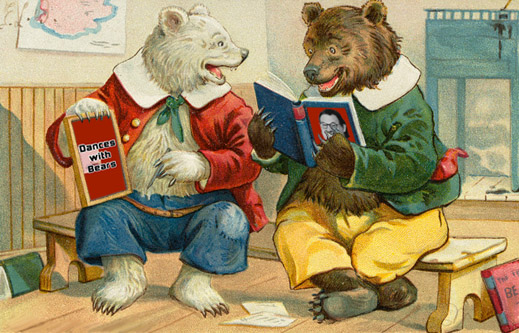
The inaugural award of the Russian Register for the Revival of all Reading (RRROAR) has been announced today. According to the citation, Dances with Bears is “attracting unprecedented resources to the written word. This deserves the recognition that it is doing more than any other published source in print or on the internet to revive reading in Russia this year.”
The award competition was initiated following reports from Russian book publishers that their business is collapsing. According to Oleg Novikov, chief executive and co-owner of Eksmo, the dominant book-publishing company in Russia today, the market of book readers is contracting by 5% to 7% per year, compared to less than 3% in other countries of comparable literacy. Every year, says Novikov, 2% fewer Russians tell pollsters that they regularly read books. Over the past decade, the proportion of the Russian population reading books has dropped from 55% to 35%. Compared to watching television, playing computer games, and tweeting, Novikov says, “reading books is a more complicated intellectual activity.”
With the encouragement of United Company Rusal and under the supervision of its senior executives, the publications on this website are being read by several hundred thousand readers each day. According to the evidence collected and verified by RRROAR, since March reading of stories on the Dances with Bears website goes up very sharply within a few minutes of publication of reports on Rusal’s lines of business. Typically around lunch, Moscow time, eager readers seek out these publications each day without being cued automatically. Instructions are then given for other readers to communicate with the server computers which host the website. Counts of these messages confirming reader interest began to hit new daily peaks in March, following reports of the break between Victor Vekselberg and Rusal chief executive, Oleg Deripaska, and the start of open shareholder rebellion on the Rusal board. This week, a new peak was reached in readership, counted in numbers of website hits and duration of the reader interest. No topic appears to attract readers in the hundreds of thousands as Russian aluminium.
Rusal has shown special interest in reading before. In a UK High Court ruling issued in October of 2006, evidence was presented that staff at Rusal headquarters in Moscow had been reading files in the computers of an aluminium trading company in London called Ashton Investments. At the time, Rusal, Ashton and associated companies involved in the aluminium trade of Tajikistan were involved in contested litigation over allegations of fraud, corruption, grand larceny, etc.
Judge Jonathan Hirst ruled that Rusal had a case to answer in the London court for what had happened, adding: “I will set aside the proceedings against Mr Deripaska and Mr Bulygin. Of course, if evidence were to arise on disclosure which implicated them personally, an application could be made to re-join them to the action.”
Rusal denied the claims, saying its employees had not been reading Ashton’s files, and that university student hackers were to blame. According to the court record, Rusal claimed its Moscow headquarters “are only about 100 metres from the Moscow State Aviation Technological University, known as MATI. The most likely explanation was that the MAC numbers were obtained and distributed amongst university students, although they could have been used by someone much further away using an aerial attached to their computer. Anyone using the wi-fi system to access another computer via the internet would leave the Rusal IP address on the other computer, so that it would appear (falsely) that it was a Rusal employee who had obtained the unauthorised access, whereas in fact it was someone misusing the Rusal wifi system.”
“The proceedings against the Rusal Defendants will continue,” Judge Hirst ruled. Rusal was then ordered to open its computer systems to a British forensic inspection team.
Deripaska has also shown commercial interest in book-reading. Before Rusal and his Basic Element holding went to the brink of bankruptcy in 2008, he owned 13 bookshops in the Bookberry chain; he had bought them in February of 2008 from Alexander Mamut and his partners. But fifteen months later Bookberry was broke, and applied for bankruptcy protection from its creditors. The records of the Moscow Arbitrazh Court indicate that more than one hundred lawsuits were filed against the Deripaska company, claiming debts of more than Rb500 million ($16 million). Here’s the court file for 2010 and 2011.It isn’t known from the court documents how much Deripaska repaid, if anything.











Leave a Reply